
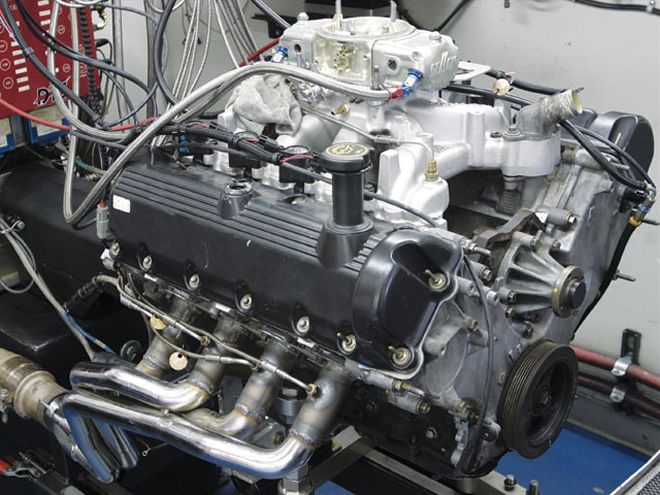 We strap the 4.6 Junkyard Jewel to the dyno one last time in search of 400 hp.
We strap the 4.6 Junkyard Jewel to the dyno one last time in search of 400 hp.
We don't usually do updates or two-part features on our Junkyard Jewels, but we walked away a little dissatisfied with the first round of testing on our $400, 117,000-mile Crown Vic refugee in the Apr. '08 issue. We just didn't have enough dyno time to get to know the MSD 6 MOD ignition better and find the tune our mod motor was most happy with. We knew we'd left power on the table, so we went back to Dyno-Motive in Placentia, California, with a few different parts to try, along with master tuner Harvey St. Mary of HMS Performance in Whittier, California, as our secret weapon. We have a slightly revised parts list, but we won't be cracking a single seal on our long-block from the last round. Everything will be tuning or bolt-on in nature. Did we hit our goal of 1 hp per dollar of the original junkyard purchase price? Read on to find out.
Stage 1Before we started, we changed a couple of ingredients from our recipe. One compromise we were sure was holding us back was the equal-length shorty headers. While they're great for torque, long tubes are what we need to really let the ported heads exhale on the top end. We called up BBK Performance in Temecula, California, and requested a pair of its chrome long-tube headers for '96-'98 Mustang GTs, which we immediately hacked up. Our previous issue was that the long tubes wouldn't clear the DTS dyno, so Troy Bowen at Ford Performance Solutions (FPS) extended the primaries about 5 inches and added bungs to monitor exhaust temps.
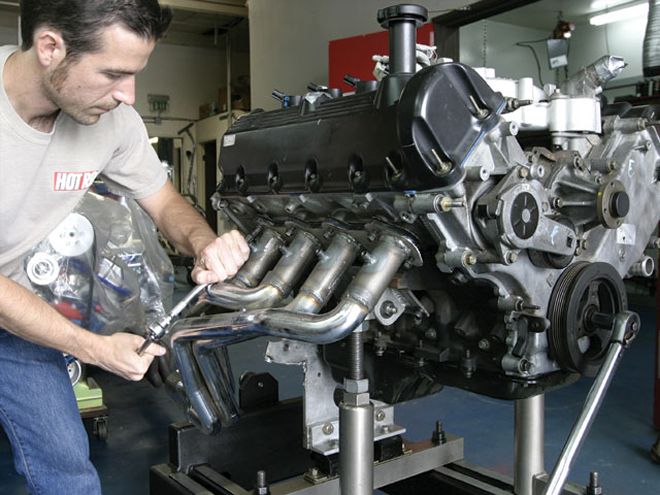 In stock form, the BBK full-length headers have 158-inch CNC mandrel-bent primary tubes and a one-piece 38-inch laser-cut flange. They should be just what we need exhaustwise to get this 4.6 to the next level.
In stock form, the BBK full-length headers have 158-inch CNC mandrel-bent primary tubes and a one-piece 38-inch laser-cut flange. They should be just what we need exhaustwise to get this 4.6 to the next level.
Eager to do some R&R for future reference, Bowen also had his crew do a little cleanup work on the Edelbrock Victor Jr. intake. Since the first test, our swap-meet Holley 650 double-pumper had grown legs and moved on to parts unknown, so we used the disappearance as an opportunity to try some more refined carburetion. Convinced the 4.6 wanted more air, Bowen recommended we go with a Barry Grant 750 Mighty Demon carb with annular boosters. But when we called the techies at BG, they were quite sure their 575-cfm Mighty Demon annular booster carb was the ticket. It sounded like a friendly wager to us, so we decided to try both.
After several short pulls with Harvey reading the dyno chart and adjusting the timing curve to compensate, we made our first full pull to 6,500 with a set of 65 jets in the primaries and 72s in the secondaries of the 575 Mighty Demon and with a revised timing curve that gave us 32 degrees of total timing.
PRODUCT PRICE 1 Barry Grant 575-cfm Mighty Demon (PN 5282010GC) $549.99 1 pair BBK chrome long-tube headers (PN 1541) 422.99 Edelbrock intake porting by FPS {{{300}}}.00 HP: 387.4 LB-FT: 354.6 GAIN: +12.8 hp at 6,000 rpm, the highest rpm on our previous testing +17 hp and 9.2 lb-ft overall DYNO RESULTS: STAGE 1 RPM LB-FT HP 3,000 295.1 168.6 3,{{{200}}} 301.3 183.6 3,400 304.7 197.2 3,{{{600}}} 309.5 212.1 3.800 312.6 226.2 4,000 314.7 239.7 4.200 321.6 257.2 4,400 330.5 276.9 4,600 342.8 300.2 4,800 350.5 320.3 5,000 353.7 328.6 5,200 354.6 336.8 5,400 352.0 362.0 5,600 346.0 368.9 5,800 340.4 375.9 6,000 335.4 383.2 6,200 328.6 387.0 6,400 317.9 387.2 6,500 313.2 387.4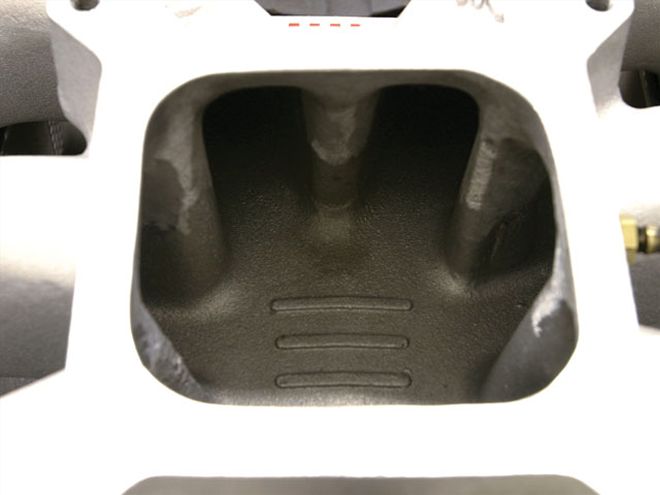 Edelbrock's new Victor Jr. casting for the 4.6 flows impressively well out of the box, and FPS determined it only required minor cleanup for our purposes.
Edelbrock's new Victor Jr. casting for the 4.6 flows impressively well out of the box, and FPS determined it only required minor cleanup for our purposes.
Stage 2
With the air/fuel ratios looking good and after a few subsequent runs showed no significant improvement with adjustments of the timing table, we tossed on one of Wilson Manifolds' tapered carb spacers. The variable radius taper works to gradually redirect and reduce the velocity of the air/fuel mixture and improve distribution. It's worked well for us in the past on various engines. No other changes were made for this run.
Stage 3Tantalized and encouraged by how close we were to that magic 400hp mark, we ran the Stage 2 combination several times and Harvey again adjusted the timing curve but got no closer to the big 4 double 0. Next up was a swap to Bowen's bet: the 750 Mighty Demon. Our initial run with 67 primary and 75 secondary jets and no carb spacer netted us 377 hp at 6,500, 353 lb-ft at 5,000, and a severe lean condition. We went up three jet sizes in the primaries and secondaries to 70 and 78, respectively. Peak power was restored to nearly exactly the same peak levels as the Stage 1 tests, however, there was a slight loss of power below 4,700 rpm. Adjusting total timing up or down from our previous 32 degrees only resulted in a loss of power.
PRODUCT PRICE 1 Barry Grant 750-cfm Mighty Demon (PN 5402010GC) $549.99 HP: 387.4 LB-FT: 353.2 GAIN: 0 hp and -1.4 lb-ft (versus Stage 1 tests without carb spacer) DYNO RESULTS: STAGE 3 RPM LB-FT HP 3,000 287.0 163.9 3,{{{200}}} 297.5 181.3 3,400 302.1 195.6 3,{{{600}}} 304.3 208.6 3,800 306.3 221.6 4,000 308.5 235.0 4,200 313.5 250.7 4,400 325.2 272.5 4,600 337.7 295.7 4,800 348.3 318.4 5,000 353.2 336.2 5,200 351.4 347.9 5,400 347.3 357.1 5,600 340.4 363.0 5,800 335.7 370.7 6,000 332.3 379.6 6,200 325.6 384.3 6,400 317.2 386.5 6,500 313.0 387.4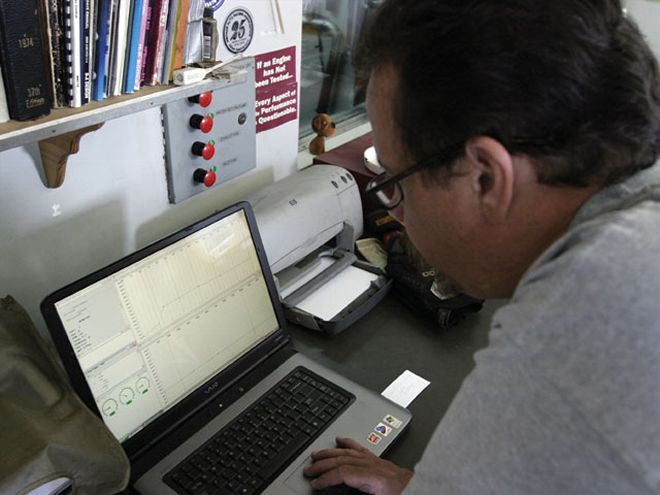 MSD's 6 MOD software is easy to work with once you familiarize yourself with it, but Harvey St. Mary of HMS Performance has years of digital tuning under his belt, so we asked him to lay some magic fingers on our 4.6.
MSD's 6 MOD software is easy to work with once you familiarize yourself with it, but Harvey St. Mary of HMS Performance has years of digital tuning under his belt, so we asked him to lay some magic fingers on our 4.6.
Stage 4For our final effort to sling our 4.6L Junkyard Jewel over the 400hp mark, we put the Wilson spacer on below the 750 Mighty Demon. Despite high hopes and half a dozen alterations to the timing curve, the 750-cfm/spacer combo couldn't match our peak horsepower and torque numbers from the 575-cfm/spacer combo. Torque also fell off faster after the peak and horsepower rose slightly slower in the lower rpm versus Stage 1 with the 575 Demon and the Wilson spacer.
HP: 390.7LB-FT: 353.2GAIN: -5.5 hp and -2.9 lb-ft (versus Stage 2 tests with carb spacer)
DYNO RESULTS: STAGE 4 RPM LB-FT HP 3,000 290.3 165.8 3,{{{200}}} 301.1 183.5 3,400 304.1 196.9 3,{{{600}}} 308.8 211.7 3,800 309.8 224.1 4,000 312.3 237.8 4,200 320.2 256.1 4,400 329.1 275.7 4,600 340.0 297.8 4,800 349.4 319.3 5,000 353.2 336.2 5,200 349.9 346.4 5,400 341.7 351.3 5,600 335.8 358.1 5,800 333.6 368.4 6,000 333.0 380.5 6,200 328.6 388.0 6,400 318.0 387.5 6,500 315.7 390.7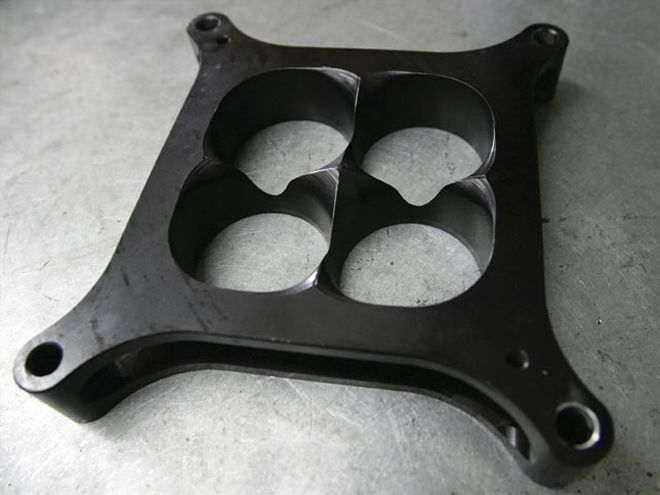 We've routinely found as much as 20 hp before using Wilson's tapered spacers; we were hoping for similar luck with this test, but 8.8 hp isn't bad.
We've routinely found as much as 20 hp before using Wilson's tapered spacers; we were hoping for similar luck with this test, but 8.8 hp isn't bad.
Almost, But Not QuiteSometimes it just happens that way, but it certainly wasn't for lack of trying. Three guys spent a 10-hour day on the dyno making 20-some pulls, trying every tuning tweak they knew to wring out that last bit of power-but 400 hp wasn't to show up. But as it sits, we've got a 396hp 4.6L for a total investment of $5,038.38. It's certainly not the cheapest almost-400hp engine we've ever built, but we're willing to bet it's the cheapest way to get a naturally aspirated two-valve 4.6 to this level. If you prove us wrong, we'd love to hear about it at HOTROD@hotrod.com.
So who won that gentleman's wager?In the end, despite a close run, Bowen and the crew at FPS owe Barry Grant's boys a round of beer, since the 575 Demon produced the most peak horsepower, with 396.2 at 6,500 rpm. Also, the 575 would be a better choice for a street car, since it proved to be slightly more responsive in the low rpm in both tests with and without the spacer.
FULL 396HP PARTS LIST PRODUCT PRICE 1 4.6L from a '97 {{{Crown Victoria}}} with 117K $400.00 1 Edelbrock Victor Jr. carb intake manifold